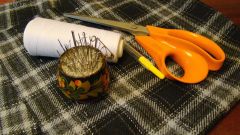You will need
- centimeter;
- - scissors;
- - threads;
- - needle or sewing machine;
- cloth;
- - strap;
- - braid;
Instruction
1
Pick up a centimeter and measure with raised hands distance from the desired length of the sleeve to the middle of the chest. Multiply the result by 2, this will be the width of a future thing. To determine the length you need to multiply by 2 the distance from the shoulder to the place where the tunic should end. Cut out the desired size of the fabric and fold it in half.
2
Make a slit for the head to the bending place. Not to be mistaken with the size and shape of the opening, take any thing on which you can copy and measure the collar. For further markers need to fold the fabric in half once on the front, this will help exactly to cut out a tunic.
3
Determine the width of the sleeves and hem. For this measure centimeter of the circumference of the hips and the circumference of the arm. Add 2 cm on both sides with allowance for joints. On the folded rectangle of fabric chalk, mark the required distance on the sleeves and hem. To the magnitude of the poluobhvat hips just in case, add 3 cm
4
Decide on the style of the tunic. You can make her tight, formfitting or loose-fitting. Lock is selected, having a chalk line from bottom of sleeve to hem. Now trim off all that excess material.
5
Sew the silhouette and sleeves of the tunic. Tuck inside all cut lines and overlarge seams. The opening for the head, you can either sew, or wrap a beautiful ribbon. If you do a wide tunic, but don't want to simply short dress, sew across the width of the elastic band, approximately 10 cm above the hem.
6
Tunics go well with various straps and belts, so you don't need to ignore this decoration. However, treat carefully to the combination of materials of the thing itself and the selected accessory.
Note
When constructing a pattern do not forget that the sleeves when lifting the arm decrease in length.









